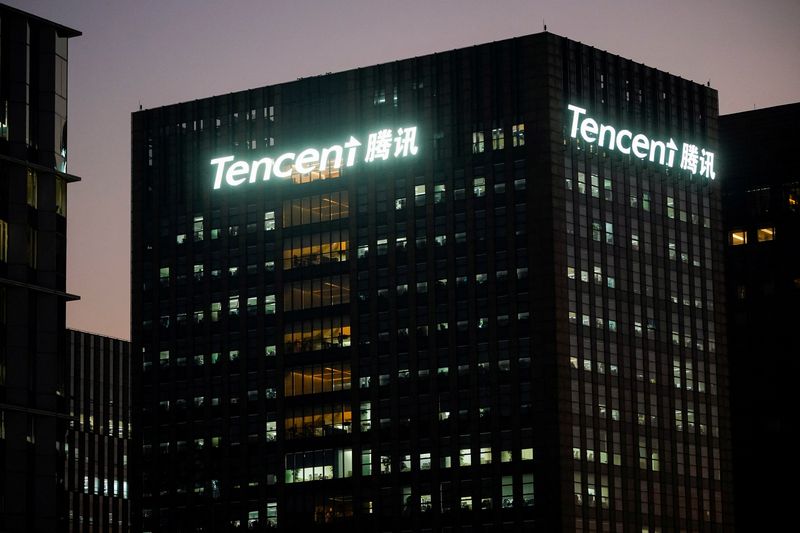By Yelin Mo and Fanny Potkin
BEIJING/SINGAPORE (Reuters) -Chinese chip designers including Tencent Holdings (OTC:TCEHY) are aggressively pitching their AI chips as alternatives to Nvidia (NASDAQ:NVDA)'s, hoping U.S. export restrictions will prompt clients to switch, said four people familiar with such discussions.
California-based Nvidia commands as much as 90% of China's $7 billion market for chips used to process enormous amounts of data to develop artificial intelligence (AI) software.
However, U.S. strategic technology controls that intensified in October have emboldened even smaller names such as state-backed Hygon Information Technology and startup Iluvatar CoreX to take the fight to the U.S. goliath.
Huawei Technologies is widely seen as making the most progress, with its Ascend 910B being compared to Nvidia's A100 in terms of computing power though not overall performance.
But Tencent and smaller AI players are accelerating chip product launches and organising more marketing visits, betting that while U.S. rules affect only the most advanced chips, they could still turn clients off Nvidia, the people said.
Tencent, China's largest social media and gaming firm, which also sells cloud services to external clients, has been pushing services that use the AI inference chip Zixiao it developed with deep learning startup Enflame, touting performance comparable to some Nvidia chips, two of the people said.
One of the people said Tencent is pitching its Zixiao v1 variant as a cheaper substitute for Nvidia's A10, used for image and speech recognition AI applications. It is also pushing an upcoming v2Pro variant optimised for AI training as capable of replacing Nvidia's now-blocked L40S, the person said.
Tencent uses Zixiao chips internally and does not sell them directly to external clients. It rents computing power to clients via its cloud services, which also offer Nvidia or AMD (NASDAQ:AMD) chips as options.
Tencent said it does not have plans to develop Zixiao beyond the current version.
"Tencent designed Zixiao to complement our cloud products and solutions in compliance with laws and regulations. It is only available to clients through Tencent Cloud's enterprise services," a company spokesperson said.
Others are pitching direct sales. Tencent-backed Enflame, which has an AI training accelerator chip called Yunsui, and Iluvatar CoreX, which makes the Tiangai graphics processing unit (GPU), have also been promoting upcoming upgrades of their offerings as substitutes for Nvidia's advanced A100 chip, two of the people said.
Hygon is marketing its newly released GPU, Shensuan No. 2, as designed from the outset to be compatible with Nvidia's chips computing platform CUDA, meaning Nvidia users can switch chips with minimal design changes, a third person said.
Last month, startup Intellifusion announced the Deepedge10 chip to compete with the upcoming H20 chip that Nvidia designed to be compliant with the latest export curbs.
A fourth person said Intellifusion brought forward its announcement to capitalise on Nvidia's situation, licensing the chip to clients even though it is yet to be mass produced.
Enflame, Iluvatar CoreX, Hygon Information and Intellifusion did not immediately respond to requests for comment. Nvidia declined to comment.
PRODUCTION CAPACITY
Technology firms in the world's second-largest economy have started to move towards Nvidia alternatives. Tencent itself has said U.S. curbs sent it looking for domestic sources of AI training chips. And internet search leader Baidu (NASDAQ:BIDU) placed a hefty order for Huawei chips, sources said last month.
"Our competitors in China, that's a whole lot of startups ... There's like 50 startups that focus on AI. Huawei is a formidable competitor. Other U.S competitors, Intel (NASDAQ:INTC), AMD are all very rigorous competitors. We have no shortage of competition," Nvidia CEO Jensen Huang told reporters last week in Singapore.
Should Chinese chip designers win orders, they could still struggle for production capacity given constraints U.S. curbs put on foundries such as TSMC from working with Chinese firms, said Isaiah Research Vice President Lucy Chen.
"The majority of China's advanced manufacturing processes and advanced packaging capacity are likely to be prioritised for Huawei's use. These emerging companies need to strategise on how to overcome the constraints posed by U.S. restrictions and production limitations," she said.
Still, the curbs have created a market opportunity as tech giants pursue a strategy of having more types of AI chips in stock rather than just Nvidia's, with sustainability of their AI strategy becoming a priority rather than performance, said Nori Chiou, investment director at White Oak Capital.
"The (United States') original goal was to slow down China's AI capabilities but, in fact, related action has boosted China's self-development capability," he said.
"Many Chinese cloud giants are working on building their AI ecosystems without U.S. chips due to these restrictions."
